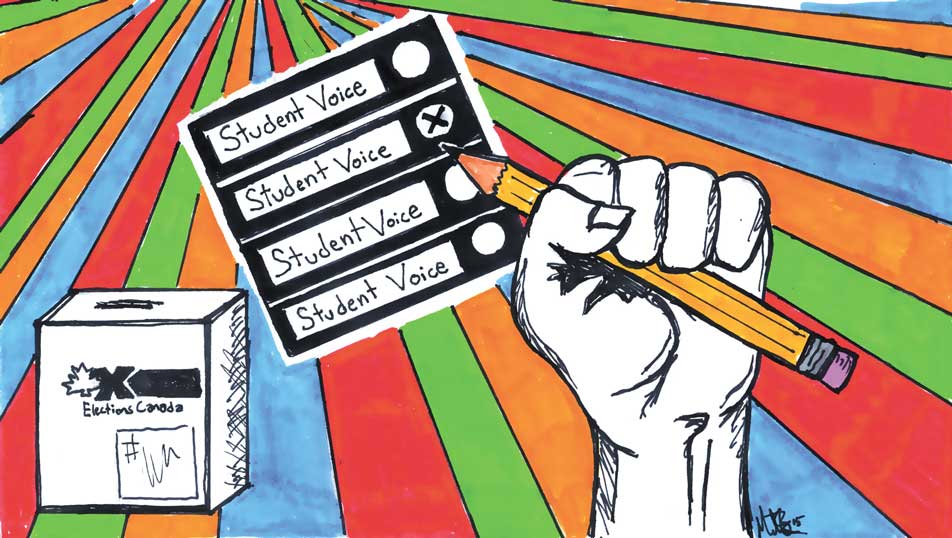
Why the student vote matters
This year, the federal government of Canada faces its first election since 2011. In Alberta, there’s been talk of a spring election. The Students’ Union elects new officials every year. If we don’t buy into democracy, we won’t have a say in who our governments are or what decisions they make.
Candidates and parties pass laws that affect us day-to-day — taxes, roads, schools, minimum wage. Voting is about choosing a direction for our country, province, city or campus.
Voter turnout among university students is notoriously low. Statistics Canada estimates that 38.8 per cent of Canadians aged 18–24 cast their ballots in the 2011 federal election, much less than the federal average of 61.1 per cent.
There are consequences when we don’t vote. Ideally, we should already be considered valuable members of society and our views should be heard. But that’s not how politics works. Politicians won’t address our concerns unless we make them. If we don’t vote, there’s no incentive for anyone to fix the problems we care about, at any level of government.
Do you want pot legalized? Want to make sure the price of your education doesn’t go up in the future? Or ensure you have somewhere safe and affordable to live? Young people could form a powerful voting bloc, forcing politicians to address our concerns and change their policies on issues that affect us.
Voting is easy. Every election, there are polling stations across the city and on campus. You sign in, check off a name and put a piece of paper in a box. If that isn’t possible, you can mail a ballot in early. If you can wake yourself up and get to class in the morning, you can vote in an election.
We’re good at convincing ourselves that voting isn’t important. We claim that one vote won’t make a difference. We say that no one cares about student issues and we pretend that all political parties are the same.
Some of this is true. One vote won’t singlehandedly change a federal election. But no one will address student issues if they think we’re apathetic. On many issues, Canada’s major political parties have similar policy. But not voting isn’t going to change any of that.
If we want change, we have to support the people trying to make those changes work. Politicians will address issues we care about if they know we’re going to the polls. We have a better chance of getting what we want if politicians know we’ll have an affect on the outcome. We can complain about market modifiers all we like, but it won’t have any effect if our leaders know they don’t have to worry about us voting for someone else.
People who make policy are usually older. They don’t have the same stake in the future that we do. They’re not going to be around to see the far-reaching consequences of their decisions. But we will, and voting is a way to make sure that the world we live in 20 years from now is one we’re comfortable with. When we don’t vote, we leave it up to chance.
So next time a peppy SU official corners you in MacHall and pesters you to vote in the next election, you can hand their flyer back and tell them you already voted.
Melanie Bethune, Gauntlet Editorial Board
